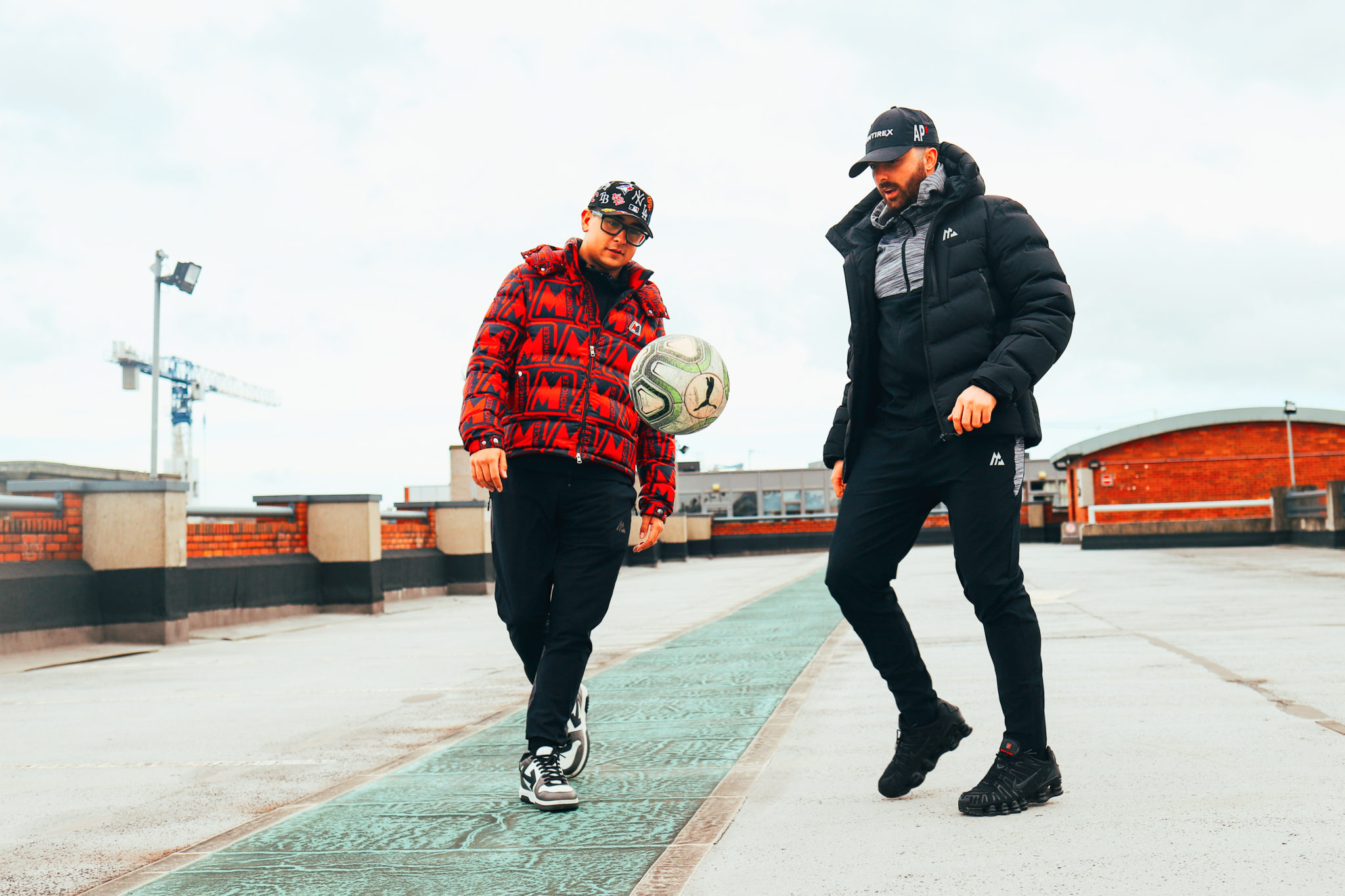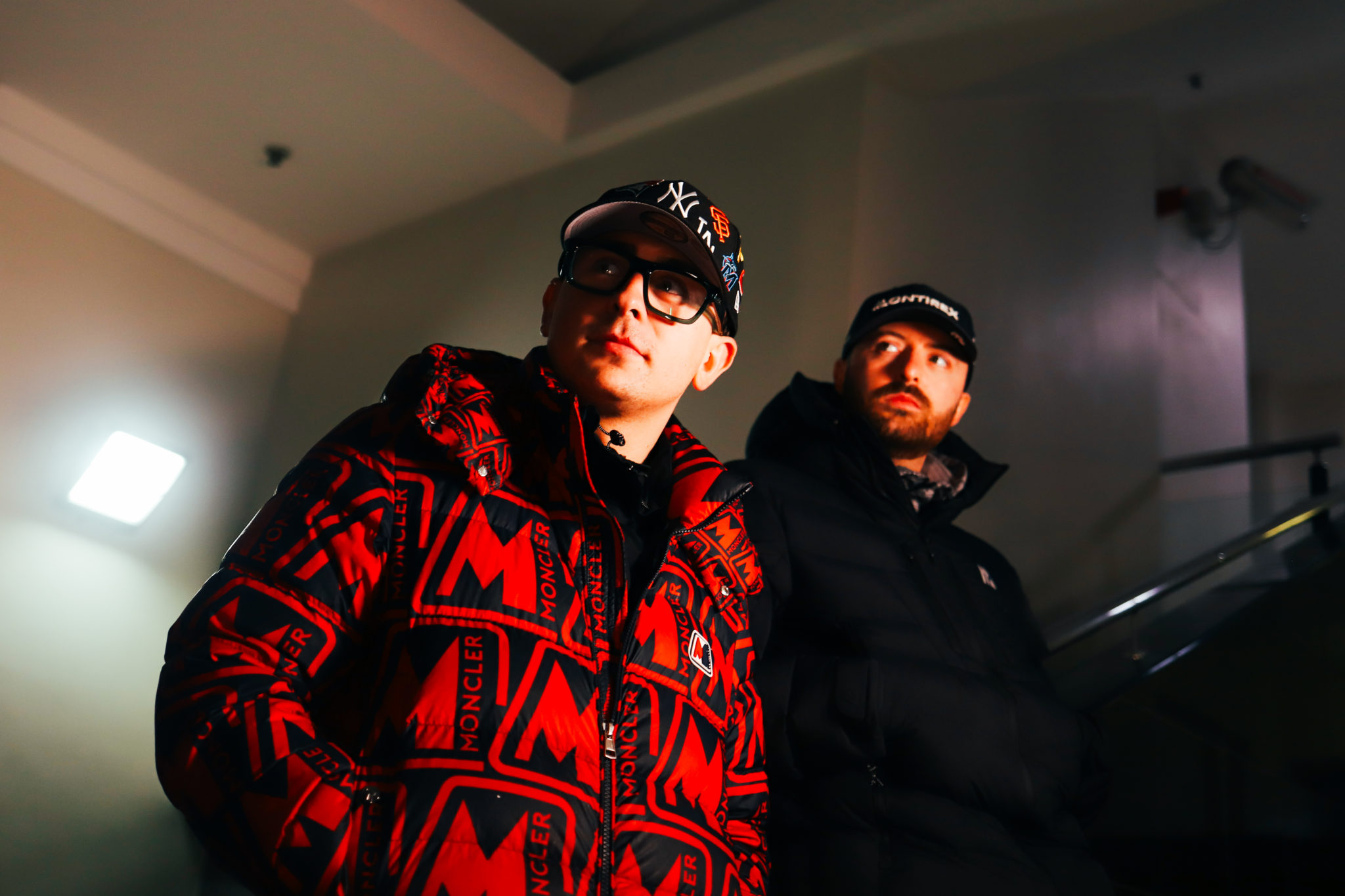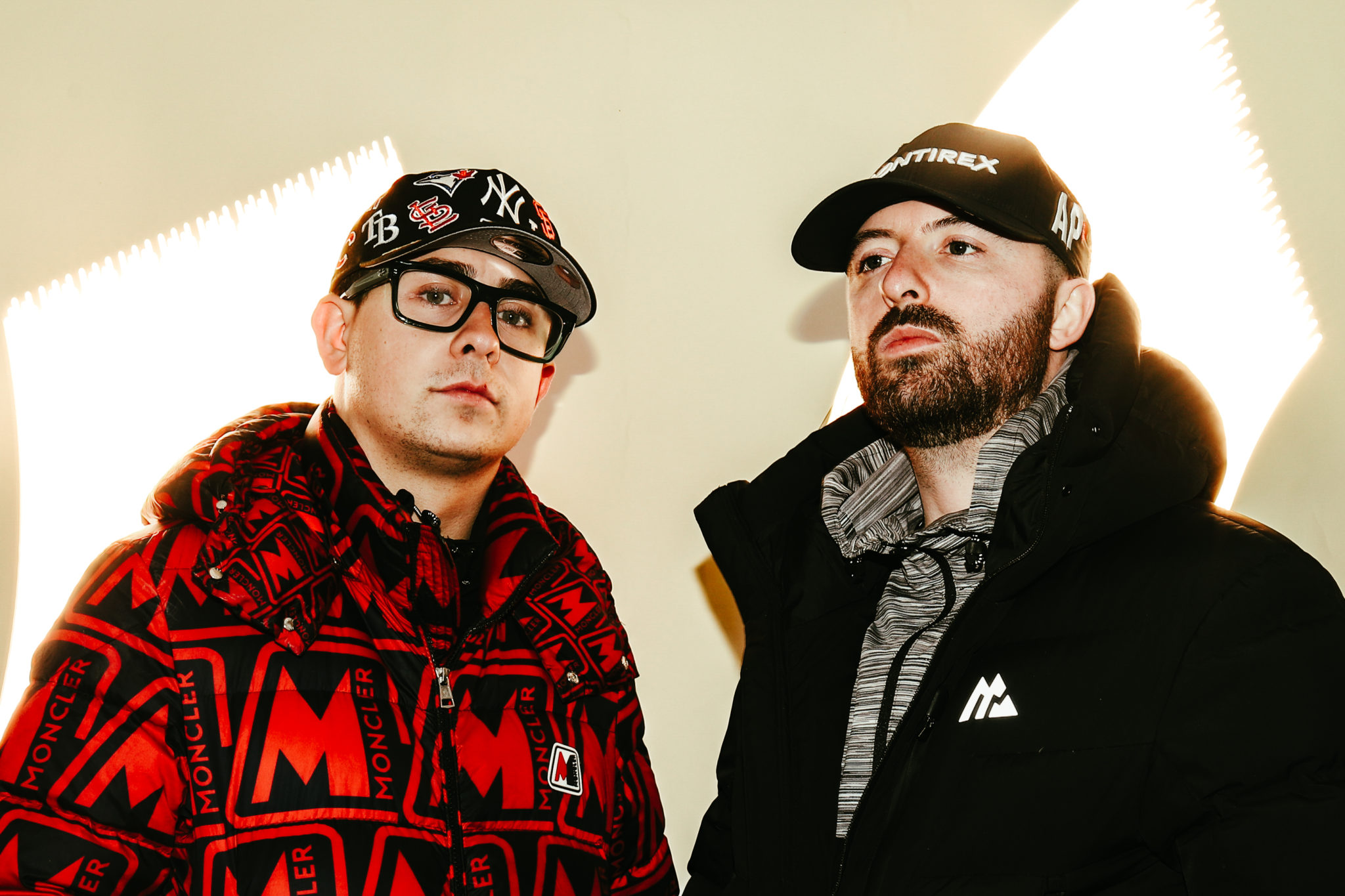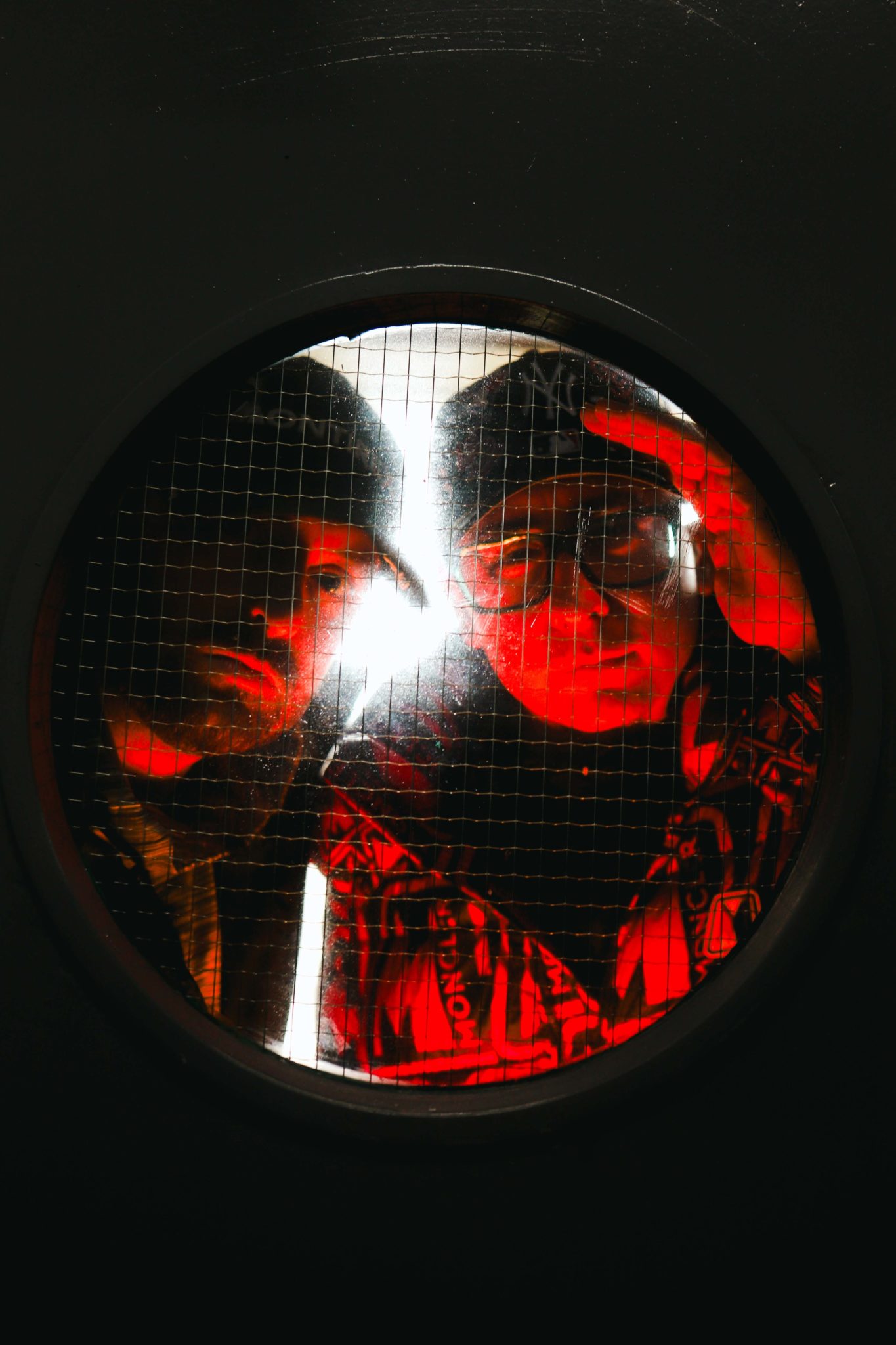- Music
- 17 Apr 25

Having enjoyed a raft of hits and performed two sold-out 3Arena dates, Dublin duo Belters Only have become standard bearers for an exciting new era in Irish dance music. They discuss their barnstorming latest EP High In The Moment, how they love working with Jazzy, championing young artists via their new label, duetting with Dizzee Rascal – and why it is so important to change the licensing laws to allow Irish club culture to flourish.
Even during a kickabout on a rooftop carpark in Dublin city centre, the Belters Only machine is whirring away. Their videographer Dan is focused on capturing every movement, while Evan, their manager, is taking a rake of phone-calls in the background.
Observing Robbie Griffiths and Conor Bissett – who recently performed their second-ever 3Arena headliner – they give the impression of being remarkably relaxed amid the mayhem. After all, that recent, rip-roaring 3Arena show boasted everything from blistering sax solos to a cameo from grime legend Dizzie Rascal, who joined Griffiths on stage to spit some fire into the crowd. What was that like?
Once the question is asked, the mood shifts.
“It was a close one, I’m not gonna lie,” Griffiths says, with a mock shudder. “He was away with his kids, so we didn’t know whether he was gonna make it, right down to the day that it happened. It was the first time I ever did something like that, so it was already nerve-wracking.
“But him turning up was just magic. No one expected it and so it really made the show. He’s a legend. We met him properly for the first time in our studio and we spoke for two or three hours about the industry. He gave us his two cents. It was mainly about protecting your authenticity and the culture. That resonated with us, because we’re not representing anything other than the culture of Ireland.”
Advertisement
The inclusion of several local DJs as support acts at 3Arena, meanwhile, reinforced Belters Only’s burgeoning status as altruistic benefactors to Ireland’s buzzing, grass-roots dance scene.
“We are definitely people who are not taking the ladder with us,” Bisset states.
“We always said,” Griffiths adds, “that when we got to a position where we could bring on talented, hard working people, we would. Everybody on that 3Arena line-up deserved it.”
 Belters Only. Photo: Abigail Ring.
Belters Only. Photo: Abigail Ring.
CERTIFIED DIAMOND
Advertisement
What’s certain is that the successes Belters Only have chalked-up to date are hugely inspirational for up-and-coming DJs, especially in their home town of Dublin. And there’s a solid musical base to it all. Griffiths comes from a family of musicians and can play the drums – though there was always, he admits, an urge “to be out front, and in control of everything.” He got hooked on electronic music after a cousin introduced him to it, and went on to become a well-known producer locally, under his Robbie G alias.
Bissett, meanwhile, spent his youth absorbing a healthy dose of his mother’s favourites, Toni Braxton and Cher among them, as well as the rap and reggae his brother favoured. He learned the DJ ropes through a YouthReach course, and had been working away on a relatively successful solo career in his attic studio in Drimnagh.
Having become acquainted on the Dublin club scene as teenagers, Griffiths joined Bisset for Belters Only, a pre-pandemic house music residency at The Grand Social on Liffey Street. The collective used lockdown wisely, taking the opportunity to refine their approach, and focus more clearly on their musical direction.
“I wanted Belters Only to be more than a club night,” Bissett told us in 2022. “I wanted to branch it out – and produce music under it, or sign artists to it and make it into a music label.”
Looking back at that interview, you can see that they always had a real sense of communal purpose, rooted in a generous working-class ethic. “We’re trying to make a blueprint for people,” Conor said at the time. “Because I don’t see anybody doing what we’re doing right now for people around the area.”
“There’s a lot more to it, for us,” Robbie added. “We’re trying to create a pathway, so young producers and young DJs can look at what we did, and how we did it, and learn from what we’ve done. We want to inspire kids, and show them that if you’re from Dublin, or from Ireland, you can still get up off your arse and do it. There’s no excuse there.”
In truth, their influence on the rise of dance music in Ireland has been immense. Belters Only became the first Irish dance act ever to be certified diamond, with the brilliant ‘Make Me Feel Good’ – sung by Jazzy – in 2021. Since then, a flurry of homegrown dance artists have gone on to enjoy streaming figures in the hundreds of millions.
Jazzy reflected on the Irish dance boom when talking to Hot Press in December 2024.
Advertisement
“We’ve had plenty of success stories come from here,” she noted. “I think it’s all grown from what Belters started, to be honest with you. I don’t remember there being anything really going on in the dance scene in Ireland before the boys put out their first song – and it’s just flourished since then.”
“I’d like to say we’ve had a part in it, in Ireland anyway,” Bissett says now. “Dance music is about getting people to feel good, which is something that Ireland lacks – we’re all a bit moody over here. We need something to pick us up.”
 Belters Only. Photo: Abigail Ring.
Belters Only. Photo: Abigail Ring.OUT OF TROUBLE
Which is exactly what Belters Only have done, acing as a tonic, not just for audiences but for ambitious young DJs. Indeed they have progressed from inspiring young acts to actively fostering them through their We Are Active label, which celebrated its first anniversary in February.
“The foundation of the label is to highlight Irish dance music,” Griffiths explains, “because we feel that, over the years, on the club scene, Irish DJs haven’t gotten a look-in, when we should have. There are very talented, hard-working individuals in this country. We like to think that we’re making the right moves for people to have a pathway in Ireland, so they don’t need to look at the UK scene, or go look at America, Asia or Australia.
Advertisement
“They can do it from home, and even from the bedroom – because that’s where we started,” he adds. “We’re giving people an opportunity to make something of themselves. That’s it really. If you work hard enough, show your passion, and show that you want to do this, we will help you. We love what we do, so we don’t mind helping people who love it as much as we do.”
It might have changed on the rock scene, and among singer-songwriters here, over the years – but there was still a sense on the dance scene that we were somehow second best. There was almost an apologetic aspect to it, as if the big names in the US, the UK and on the continent were just too far ahead for us to catch up. Not so, Belters say.
“We’re trying to change the mentality in Ireland,” Griffiths explains. “We’re trying to change the culture and make it a more positive place and we feel like we are doing that now. There’s some smashing artists coming up.
“Confidence and belief was lacking before,” he expands. “There wasn’t a realisation that this is possible for an Irish individual. If you were to take any artist around us right now, they all have their own individual story. And none of it was easy. Being from working class areas, from places where this kind of success is unrealistic to them – they’ve had to overcome them battles every single day.
“People stand on the outside looking in and think ‘they’re doing well’ – but there are major problems in Dublin with the mentality. These people have had to fight that every single day.”
“Everyone seemed to think it’s just impossible to do it,” Bissett adds. “Where we’re from, nobody really got out. So we’re trying now to break down these walls by putting people on. We want to do what we can for the community and give back.”
It’s important to be realistic about the obstacles people do face. Whan an area is under-privileged, there is a far greater likelihood of addiction, of falling foul of the law, of being dragged down by the sense of frustration, and of ennui that the system imposes on so many.
Advertisement
“I think things just get suppressed,” Conor reflects, “and families are cursed all the time. It gets passed down through generations. Obviously in working-class areas it doesn’t help when they’re flooded with trouble and stuff like that – and when there’s nothing for people to do.
“Nowadays there’s community centres,” he adds, “but they’re only open for a couple of hours a day and for the rest you’re fending for yourself out there.”
Ireland’s two-time Olympic champion Kellie Harrington has spoken of how close she came to losing her way completely in her early teens, crediting the early school-leavers programme YouthReach with saving her from a ruined life. Conor Bisset had a similar experience.
“It,” he says of YouthReach, “was one of the things that kept me off the streets and out of trouble. I was probably one of the lucky ones. I have family members that are addicted to drugs, I have a lot of friends locked up. So like I said, not so many people get out.”
Do Belters Only feel a sense of duty to be mentors?
“I suppose it is a duty in a way,” reflects Bissett. “As Robbie said, we struggled to get into the industry. We didn’t know where to go, what to do, or who to speak to. We still don’t understand most of the industry. We’re learning day-to-day. But we need to teach the younger crowd coming up, so they’re not in a bad position in a couple years with contracts or whatever. It’s about helping people.”
 Belters Only. Photo: Abigail Ring.
Belters Only. Photo: Abigail Ring.Advertisement
THE SAME PERSON
Learning day-to-day. That is something to which we should all aspire. It is how we grow. It is how we improve. Belters Only may be focussed on inspiring younger DJs and producers – but their can-do attitude and thirst for knowledge also offer an inspiring model for anyone who values artists who are real, genuine, committed – and rooted.
“I think it’s because we’ve formed a circle and created our own team,” Griffiths says of their success in grappling with the complexities of the music business to date. “And because we’re all like-minded individuals, it’s easier to be strong in the industry and push through to break down barriers. If it wasn’t for that, then we wouldn’t be able to give the pathway to people that are coming up now.
“That’s something we project on them as well,” he adds, “which is the need for community. You can’t do this on your own, or you shouldn’t have to. We’re happy to be giving people from Dublin, and from the whole of Ireland, an opportunity to get themselves out there on the world stage. If everyone gives back then we become stronger together.”
One of the biggest issues is that places for young DJs to perform are so few and far between in Ireland right now. Before their weekly slot at the Grand Social, Griffiths and Bissett cut their teeth playing clubs around Dublin, citing the now-closed Sin – across the road from the stage door into the Olympia Theatre – as an important stomping ground for their development.
The closure of Sin back in 2017 wasn’t an isolated incident. In 2000 there were 522 nightclubs in Ireland. In January this year, campaign group Give Us The Night reported that the figure now stands at just 83. Most people recognise that Dublin is suffering as a city because of the failure to update the licensing laws and extend nightclub opening hours. But politicians seem to be dragging their heels in the issue, despite promises for reform.
Belters Only are extremely frustrated that nightlife options have been dwindling so badly, during what is otherwise a new heyday for Irish dance music.
Advertisement
“Jazzy and Belters Only wouldn’t be what they are, or what we are, if it wasn’t for the nightclubs we went to,” Griffiths says, “It was a proper environment. We grew up with ’90s dance music. In terms of the mainstream, it was something that wasn’t really respected, but it has a history here in Ireland. I was in the Dáil talking to the politicians about my story – and since then nothing has changed.
“If anything, it’s gone backwards, after the election,” Robbie adds. “We need the whole industry to get behind Sunil Sharpe and the Give Us The Night campaign, because he’s doing God’s work. Since Covid, the industry has been forgotten about very quickly.”
The pressure has to come from all sides. It is about push – and pull.
“We’re trying to make it better with the label,” says Bissett, “because the more artists we bring on, the better the country is for dance music. And obviously that might help with clubs opening up. Young kids have energy, they’re better off putting it in the right place, you know?”
A need for greater equality has also been a point of discussion. Are female artists getting the support they deserve?
“If you look at our project, and if anyone wants to do their research on what we do, they’ll see that we’re fully behind any female artists who work hard. If you look at Kayleigh Glynn, she’s on the come-up, and she’s going to be serious soon. Look at Jazzy, and all the work we’ve done with her.”
Which, of course, is as good an answer as you could get. Working with Belters Only, Jazzy has become the biggest-ever female Irish dance success.
Advertisement
As well as their collaboration on ‘Make Me Feel Good’, Robbie G and Bissett produced the Crumlin native’s debut single ‘Giving Me’. The tune soared to the top of the charts and triggered a tidal wave of success for the singer, who won multiple Choice Prize awards and became the most listened-to Irish female artist on Spotify.
Their fruitful partnership is revisited on the new Belters Only EP, High In The Moment. What makes them work so well together?
“Listen, it’s always a pleasure to work with Jazzy,” Bissett says. “We grew up in the same kind of environment. We went to the same clubs, which shaped our taste and sound. When we went into the studio years later, it just gelled.”
“She ticks all the boxes,” Griffiths says. “She’s just a genuine individual. She doesn’t change because of her fame or anything like that. She’s still the same person now and she stands by that. It’s something we stand by as well. We’ve nothing but respect and praise for Jazzy, because she deserves it. She’s a natural talent.”
Their new EP also allowed Belters Only to flaunt a refined sound.
“These tunes have been made for nearly two years now, so it’s good to bring them alive and get them out there,” Bissett says. “I think it’s more mature. Even today, we’re making different music than that again. So it’s always evolving, it’s always changing, it’s always getting better. It’s always getting more like us.”
“There’s a lot of versatility in this specific EP,” says Robbie. “There’s three completely different songs. One you could hear playing at a festival, one you could hear on the radio, and one you could hear in a basement.”
Advertisement
 Belters Only. Photo: Abigail Ring.
Belters Only. Photo: Abigail Ring.SHOCK TO THE SYSTEM
You might wonder how the duo managed to find time for studio work with their hectic live schedule, including Ibiza residencies and a recent Australian tour. They’ve had to learn the importance of maintaining a clear head while on the road.
“There’s definitely a stigma in the industry,” Griffiths says, “but I think sobriety is a lot more attractive these days. You see a lot more artists preaching it. You have the likes of BLK – he announced he was a year off not too long ago. Ben Hemsley is another one.
“I think wellness is a lot more attractive than partying now, so I hope that continues, because we’re on that buzz as well. Clear mind, clear productions.”
On upcoming projects, Belters Only hint at a return to their deep house roots.
“We’re craving the clubs now,” Griffiths says. “They’re a different type of show to the big ones. With a proper DJ set, there’s a more intimate crowd. That’s what we grew up on, so we’ll never get too big for them. We’re club DJs, no matter how successful our music becomes.”
Advertisement
Their meteoric rise notwithstanding, the last couple of years have been marked by personal struggles and loss. May will mark the second anniversary of the passing of Robbie’s mother.
“It was a shock to the system,” he acknowledges. “because she was the one individual that I would have turned to. It’s hard trying to adapt to that, it probably always will be. But when you have a team around you, and you have the right people and the boys there, it makes that a little bit easier.”
Bissett has also faced some “ups and downs” in his personal life.
“I didn’t have the best year,” he admits. “My Ma had a gambling addiction, so she basically lost the house for a couple of months. We were able to get it back, luckily.
“I got engaged last year,” he adds. “And there’s a baby on the way now in May. So it’s all looking good.”
Whether they’re behind or away from their DJ decks, the rock-solid stability at the heart of Belters Only is founded upon the synergy between two close friends.
“As I said with the Jazzy thing, we grew up in the same environment and had the same taste,” Bissett says. “We knew exactly what kind of sound we were looking for, and when we got in the studio together, it just clicked.”
“We have the same vision,” Griffiths says. “Bissett was the first person that was like-minded in how broad his visions were for Dublin. There was something that clicked between the two of us, in terms of how we visualised our futures.
Advertisement
“We are two very strong characters, so we clash a lot. But that’s a good thing, because it means we’re both passionate about what we do. It shows that we both want this to happen in the best way possible, and that goes for the whole team.
“That’s why we break down these barriers and why we’re the ones who broke these records. Ups, downs or roundabouts – it doesn’t matter. We both believed wholeheartedly that this could be possible.”
• The High In The Moment EP is out now.










